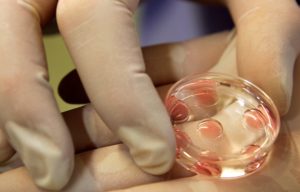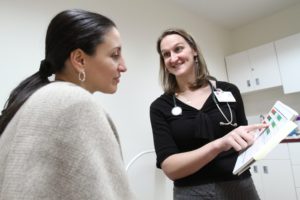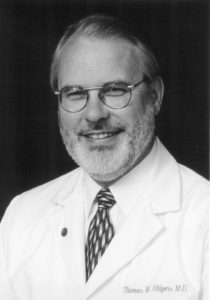Cassie Taylor and her husband, Michael, were married in 2016. She was 27 and in the midst of a reversion to the faith; her husband, 31, had discerned out of religious life because he felt a strong desire to be a husband and father.
Two years into marriage, Cassie was diagnosed with ovarian and uterine cancer and had to undergo a hysterectomy.
“From the time we found out I was sick to the time of the surgery, it was only three months,” Cassie remembered. “We had to come to terms very quickly with the reality that we were never going to have our own biological children.”
Her oncologist proposed getting a surrogate. Friends asked if she wanted to freeze her eggs. Cassie wanted to explain her commitment to the Church’s position against the use of technology which separates procreation from sexual intercourse and endangers embryonic life, but the pressure to find any solution was palpable.
“There’s only so much you can do to defend the faith from the exam table,” she laughed. Then her tone turned somber. “At that point, I just wanted a place to talk about my grief.”
“Like every young Catholic couple … we thought we were going to look at each other and get pregnant,” Matthew Marcolini shared in a video reflection for the Diocese of Arlington, Virginia.
After months of failed pregnancy tests, surgery, and the reality of infertility setting in, his wife, Elizabeth, experienced a spiritual desolation.
“It’s hard to believe that a God who loves you wouldn’t want to give his daughter everything that she’s asking for,” she confided in a friend.
Matthew struggled watching his wife suffer such profound disappointment. The couple thought back to a conversation they had in marriage prep in which they both shared they were open to adoption. “That was a hypothetical conversation, but a providential one,” Elizabeth said.
Five years into marriage, after prayers and pilgrimages in search of peace, they got a phone call from a friend who had heard an announcement at daily Mass: a local woman was two weeks away from giving birth and looking for adoptive parents for her child with medical needs.
Matthew told his wife that someone had found their baby.

Catholic couples like the Taylors and Marcolinis are used to hearing about the need to be “open to life” and forsake personal comfort for having a larger family than the social ideal.
But a growing number are struggling with the opposite: not being able to conceive or bear children at all.
They are part of a statistically significant number of people across the world experiencing infertility, broadly defined as the inability to conceive after one year of unprotected sex for women under 35 and six months for women 35 and older.
According to a report issued by the World Health Organization, 1 in 6 people worldwide — between 60 and 80 million couples — experience infertility during their reproductive years.
In the U.S., 1 in 5 married women between the ages of 15-49 with no prior births have difficulty conceiving. Miscarriage moves that rate up to 1 in 4.
Common causes of infertility include: Polycystic Ovarian Syndrome, which impedes ovulation; improper functioning of the thyroid, pituitary gland, and hypothalamus; structural abnormalities or growths in reproductive organs; endometriosis, in which uterine lining grows outside of the uterus; poor sperm quality and count; and sexually transmitted infections.
Additionally, delayed childbearing is driving up rates. More women are waiting until their mid-late 30s and early 40s to try to conceive.
According to Caroline Gindhart, a certified nurse practitioner at University of Pittsburgh Medical Center, Divine Mercy Women’s Health, “Fertility drops a little after 30 but takes a nose dive after 40.”
“I don’t think a lot of women want to be getting married later, especially my Catholic female patients,” she said. “But that’s just the way the world is.”
The default assumption within the medical community is that individuals and couples will use artificial means of procreation — from donor gametes to IVF to surrogates — to have biologically related children. Insurance companies today are more likely to provide coverage for these services but not for alternative treatments. And the proliferation of celebrities using these means of reproduction is shifting cultural perceptions about everything from success rates to moral acceptance.

The challenge the Church faces is to help an increasing number of Catholics, many who suffer in silence, to discern God’s plan for their marriage and pursue avenues to be fruitful that respect God’s plan for life and love.
Therese Bermpohl, director of the Office of Family Life for the Diocese of Arlington, Virginia, said she was receiving call after call from priests asking what they could do for couples in their parishes who felt unseen and needed support.
“I think as a Church we tend to minimize the loss and grief associated with infertility and miscarriage.”
Her office launched Our Fruitful Love, a website that “provides practical resources, testimonials, Church teaching, and a community that stands with people in their sorrow and grief.”
One of their most popular initiatives has been an annual novena concluding on the feast of Our Lady of Guadalupe. Bishop Michael Burbidge, who leads the diocese, offers a private Mass for participants at its conclusion.
While she encourages participants to pray for miracles, she’s always moved when people let her know it helped them come to “complete peace” about God’s plan for their marriage.
Bermpohl established a mentorship program which pairs up more experienced couples with those new to grief, expectation, and disappointment. “Community is key,” she said.
Chris O’Neill, director of the Office of Marriage and Family Life for the Diocese of New Orleans, said his team tries to address infertility in marriage preparation.
“We try to emphasize how a child is a gift,” he said. “We share with couples that you love each other and attend to a life that you share together, and that life starts to bear fruit. It may or may not include children. The commitment is not to build the life you want — it’s to love each other with everything you have and to let the marriage take the shape that God grants.”
How and when the Church speaks about infertility is a topic which Melissa Moschella, associate professor of philosophy at The Catholic University of America, thinks a good deal about.
“The places where the Church talks most directly about infertility are in documents concerning ethical issues about reproductive technologies,” she noted, citing Donum Vitae (“The Gift of Life”) and Dignitas Personae (“The Dignity of the Person”).
Moshcella believes there are limitations to that treatment, because infertility is never explored as its own topic. And while the Church expresses sympathy for couples who desire to have a child, it has not yet offered a comprehensive theological look at marital fruitfulness outside of forming a family through procreation or adoption.
In her courses exploring the ethics of reproductive technologies, Moschella has begun presenting students with information about fertility awareness-based methods of family planning. “Most of my female students have never heard of these. Most don’t understand how their cycles work or what the signs of fertility are,” she said. “The fact that things can actually be treated is new to them.”

The good news is that Catholic physicians have been advancing treatment for infertility for decades.
Gindhart is a part of a health care practice that specializes in Naprotechnology, an approach to fertility pioneered by Dr. Thomas W. Hilgers, the director of the Saint Paul VI Institute for the Study of Human Reproduction and the National Center for Women’s Health in Omaha, Nebraska.
With colleagues at the St. Louis University and Creighton University Schools of Medicine, he developed what is known as the Creighton Model FertilityCare System. Beyond helping to address infertility, this method is used to treat repeat miscarriage, postpartum depression, premenstrual symptoms, and preterm birth.
Unlike mainstream endocrinology and fertility medicine, which uses a standard 28-day cycle to evaluate hormonal imbalances in women, Naprotechnology looks at each individual woman’s biomarkers to create what Gindhart calls a “total hormonal profile.”
“Standard fertility medicine will spend three months prescribing medicine to strengthen ovulation and then move onto IVF,” Gindhart said. “Naprotechnology seeks to restore fertility by getting to the root cause of the problem.”
The practice involves an analysis of all of the hormones involved in a women’s cycle (not only those related to ovulation), robust testing of the thyroid, surgical interventions, and identifying causes of inflammation or insulin resistance.
Gindhart noted that physicians are starting to acknowledge that the Western diet and lifestyle is contributing to the issue.
“As far as male infertility is concerned, alcohol, drugs, high blood pressure, and cholesterol can all contribute,” she said. “For women, there are a lot of endocrine disruptors in our diet, cosmetics, and the containers we drink and eat out of.”
Gindhart says the widespread prescription of the birth control pill to girls, who often stay on it until they are ready for childbearing, is contributing to the problem. Some studies indicate that the pill interferes with the production of cervical mucus, which is important for fertilization.
But a bigger issue is that the pill is widely prescribed to relieve painful symptoms of menstruation, which are often indicative of underlying issues like endometriosis. Because the condition advances even when symptoms are ameliorated, women come off the pill after a decade or more to find that they had been unknowingly masking an underlying condition.
While not all of her patients conceive, Gindhart finds satisfaction that almost all of them say that they are thankful to have “ found someone to take them seriously, listen to them, and give them a real diagnosis.”
Many women report that they simply want someone to acknowledge they exist and to hear what it feels like to have their body fail them.
A turning point for Cassie Taylor was registering for an online retreat focused on infertility and grief, hosted by a ministry called Springs in the Desert. She was relieved to hear they were “Christ-focused, not conception-focused.”
Springs in the Desert was born from the personal experience of Ann Koshute, who began to observe common feelings about identity, vocation, and isolation in her conversations with other Catholic women experiencing infertility.
“We’re all kind of hidden,” she said. “The ministry started out of necessity, because we needed accompaniment.”
Springs in the Desert has become one of the leading ministries for Catholic couples experiencing infertility, offering retreats, educational and pastoral resources, a podcast, small groups, and online events.
Taylor now manages its social media accounts and hosts its podcast. The demand is increasing, evidenced by the growing body of podcast listeners, engagement with social media, and the number of dioceses promoting its work.
Koshute hopes they can help facilitate some changes in the way Catholics approach the topic and those affected by it.
“Within the Catholic space, there is often an idolizing of the child and the big Catholic family, which is the flip side of the contraceptive mentality and a culture focused on self-fulfillment. But it can create a culture that says the way to holiness is producing children.”
“We need to be reminded that our marriages are life-giving, that they are powerful witnesses in a world where people so easily give up on theirs because they don’t get what they want or don’t feel personally fulfilled,” she said.
Her ultimate hope for the ministry is that couples will better come to know Christ as the wellspring in what she calls the “desert of infertility.”
Marcolini wishes Catholics would refrain from making assumptions about childless couples, couples with a small number of children, or couples who have adopted, saying that it’s impossible to know what anyone is going through or what has gone into their discernment.
Now a mother of two adopted daughters, Zelie, 2, and Gianna, 6 months, Elizabeth said her experience “has been a deeper invitation into the mystery of divine love since we are all adopted sons and daughters of God.” She and her husband share their story with other couples preparing for marriage in their diocese.
When asked what she would say to others facing infertility, Elizabeth said to pray for what you desire, but not to spend your marriage and life waiting for something that is not promised.
“Receive what God has for you today. God is a God of the present, not of the past or the future,” she said. “So live right now.”

